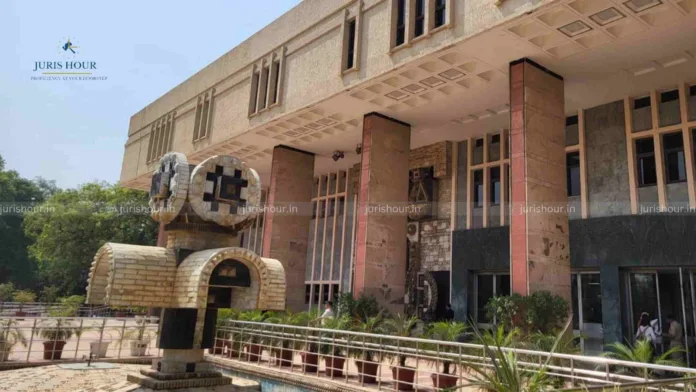The Delhi High Court has dismissed writ petition challenging clause for determination of rewards for informers under the guidelines issued by Central Board of Excise and Customs (CBEC) (Anti-Smuggling Unit) citing the principle of constructive res judicata.
The bench of Chief Justice Devendra Kumar Upadhyaya and Justice Tushar Rao Gedela has observed that in the earlier round of litigation, the petitioner had challenged the decision of the respondents whereby his claim for payment of a particular quantum of reward was not acceded to. At the time of filing the earlier writ petition, which has been dismissed, and the intra-court appeal has also been dismissed by this Court, Clause 3.3 of the Guidelines was available and, therefore, the same could have been, or might have been, challenged by the petitioner in the earlier writ petition itself.
The petitioner has sought the declaration of Clause 3.3 of the Guidelines for Grant of Reward to Informers and Government Servants, 2015 as unconstitutional and ultra vires in violation of Articles 14 and 21 of the Constitution of India to the extent it provides for determination of rewards for informers.
The Central Board of Excise and Customs (Anti-Smuggling Unit), Department of Revenue, Ministry of Finance, Government of India has issued revised guidelines vide its circular dated 31.07.2015 which are known as “Grant of reward to informers and Government Servants – Review of Policy, Procedure and issue of revised Guidelines” which are applicable for grant of rewards to informers and Government Servants in respect of cases of seizure or infringements/ evasion of duty/ service tax etc which are detected under certain enactments, namely the Customs Act, 1962, Central Excise Act, 1944, Narcotic Drugs & Psychotropic Substances (NDPS) Act. 1985 and the Finance Act, 1994.
The guidelines are applicable for reward in respect of cases of detection of drawback fraud or abuse of duty exemption schemes under various export promotion schemes, which are unearthed on the basis of specific prior information provided by the informer or prior intelligence developed by the Government Servants. The guidelines are applicable from the date of issue i.e. 31.07.2015.
The petitioner provided intelligence regarding central excise duty evasion at multiple locations. Pursuant to this, the respondents issued a show cause notice to the defaulting company, demanding Rs. 23.89 crores for clandestine sales. On 10.02.2020, the dispute was settled under the Sabka Vishwas (Legacy Dispute Resolution) Scheme, 2019, reducing the liability to Rs. 11.94 crores.
The petitioner approached the Principal Director General, DGGI, New Delhi, seeking 20% of the recovered amount (Rs. 2.33 crores) as reward. In response, a reward of Rs. 25 lakhs (approx. 2%) was granted. Dissatisfied, the petitioner made further representations, claiming entitlement to Rs. 2.38 crores under Clause 5.1.1 of the applicable Guidelines, which permit informers rewards of up to 20% of recovered duty, penalties, and fines.
The petitioner, aggrieved by the order seeking its quashing and a direction to CPGRAMS to reconsider the matter. The petitioner also sought disbursal of a reward amounting to 20% of the net sales/recovery. However, the writ petition was dismissed by a Single Judge of the High Court on 29.10.2024. The Court held that under Clause 3.3.1 of the Reward Guidelines, granting such rewards is discretionary and not a legal right enforceable under Article 226 of the Constitution. The Court relied on Union of India v. R. Padmanabhan, which held that rewards under such schemes are ex-gratia and not subject to mandamus unless a statutory duty exists.
The petitioner then filed an intra-court appeal (LPA 1219/2024), which was also dismissed by a Division Bench on 17.12.2024. The Bench agreed with the Single Judge’s interpretation of Clause 3.3.1 and noted that since the reward guidelines were not challenged, there was no need to examine them further.
The court while dismissing the writ petition held that Challenge to Clause 3.3 of the Guidelines, having been omitted by the petitioner in earlier round of litigation, in our opinion, by applying the principle of Constructive Res Judicata, the instant writ petition, where a prayer to strike down Clause 3.3 of the Guidelines as being unconstitutional has been made, will not be maintainable. If such a challenge is permitted, there will be no end to the litigation between the petitioner and the respondents. The principle of Constructive Res Judicata has evolved as a matter of public policy to prevent multiplicity of litigations on an issue.
Case Details
Case Title: S C GUPTA Versus UOI
Case No.: W.P.(C) 4462/2025 & CM APPL. 20619/2025
Date: 05.05.2025
Counsel For Petitioner: Manish Raghav and Mr. Shivaansh Dixit
Counsel For Respondent: Chetan Sharma

